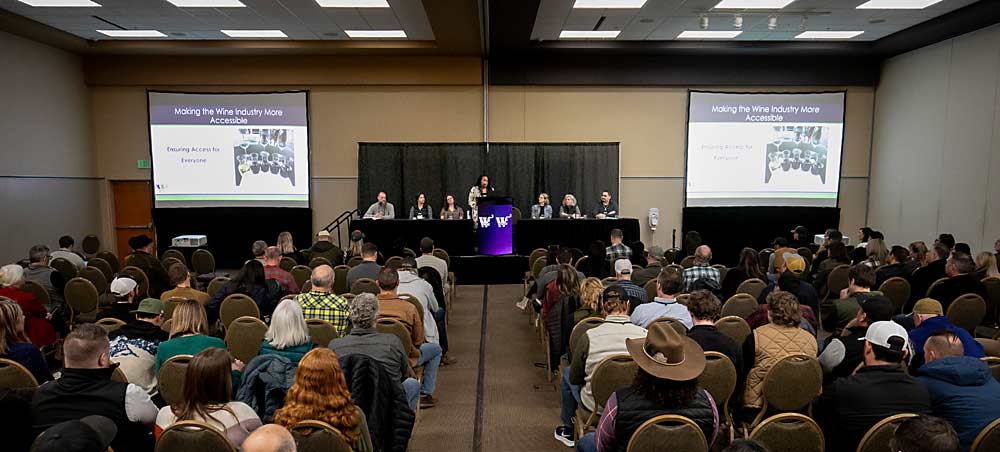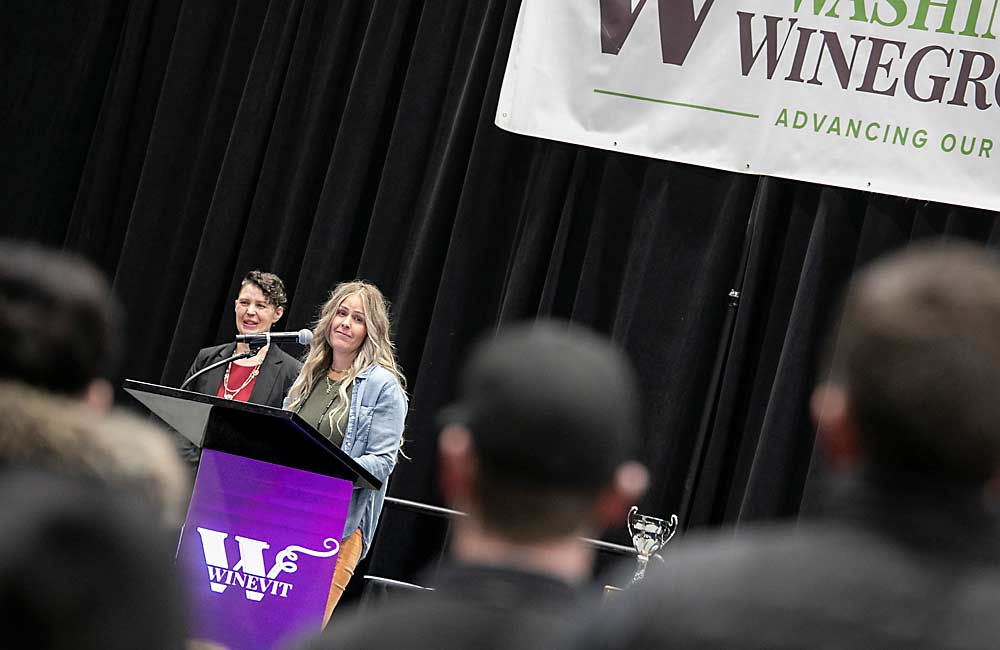
Who are the wine drinkers of the future? Who are the future workers — at every level — to drive success? Almost certainly, it’s going to be a more diverse community than in the industry’s past.
“More people of color are entering the wine industry from all access points,” said Lakaya Renfrow, a consultant for the Washington State Wine Commission. But they need to feel a sense of belonging to stick around, she added. “I tend to frequent businesses where I feel seen, heard and valued.”
The increasing diversity in the younger generations in the U.S. creates opportunities but also requires the Washington wine industry to look at the barriers that have kept some people of color from seeing themselves in the industry. Renfrow moderated a panel discussion on this topic to kick off WineVit, the annual convention organized by the Washington Winegrowers Association.
Panelists included Todd Newhouse of Upland Vineyards, Devyani Gupta of Valdemar Estates, Sadie Drury of North Slope Management, Ashley Trout of Vital Winery, Rosanna Lugo of Seven Hills Vineyard and Victor Palencia of the Palencia Wine Co.
They discussed strategies to recruit and retain a diverse workforce and appeal to more consumers.
“It’s about moving away from the idea that wine is for snobby old men,” Drury said. “Wine is a place to gather with food and friends.”
That idea of gathering and celebrating resonates across cultures, Palencia said. His winery leans on alternative distribution channels, such as community festivals, to introduce people to wine. Wineries don’t always think of Latinos as a big customer base, but wine goes great with carne asada, he said.
“We’re constantly thinking outside the box. We make it fun,” he said.
Having a diverse and welcoming tasting room staff can help customers feel comfortable and feel that wine is accessible to them, panelists agreed.
Industry honors
At the Leadership and Legacy luncheon, the annual awards were presented by friends of the honorees.
Kari Smasne, manager of the Sustainable WA program, presented the Erick Hanson Memorial Grower of the Year Award to Carly Faulk, vineyard manager at Four Feathers.
“She has done a remarkable job with the new sustainability program and has really been involved asking questions, making sure she has covered everything,” Smasne said.

Faulk, who started her wine industry career at 18 putting bottles in cases at Hogue Cellars in Prosser, thanked all of her mentors and supporters.
“I’ve worked in some of the greatest vineyards in this industry,” and learned from so many people, she said.
Longtime winemaker Cheryl Barber Jones presented the Grand Vin award to her friend, Kay Simon, winemaker and co-owner of Chinook Wines in Prosser. After starting her career at Ste. Michelle Wine Estates, Simon founded Chinook Wines with her husband in 1983, when Washington had fewer than two dozen wineries.
Barber Jones praised Simon’s extraordinary winemaking talent, yes, but also her partnership, mentorship and service to the industry.
Simon is “committed to helping the industry be the best,” she said.
Dustin Tobin of Winemakers LLC presented the Industry Service Award to Jack Maljaars, the owner of Vine Tech Equipment.
“He grew his company into a leading force in the industry and is the innovator and brains behind it all,” Tobin said. “He always wants more collaboration. He knows everyone has something to add to the industry, whether knowledge, skill, time or passion.”
Two Lifetime Achievement awards were presented posthumously to men who played instrumental roles in the growth of the Washington wine industry. The award were presented by longtime colleagues and friends.
First, Mike Januik shared a tribute to the late Dick Shaw, founder of Shaw Vineyards. Shaw began his wine industry career with an investment in a 100-acre vineyard planting on the Wahluke Slope in 1981. He and his wife, Wendy, grew their business to over 3,000 acres. But in his own early years, when it took creativity and tenacity to build a wine business, Januik said Shaw stepped in to help him in a big way.
“He made it possible for us to do what we were doing and continue to survive,” he said. That’s how he treated people his whole career, he added.
Shaw’s wife, Wendy, accepted the award on his behalf, saying that if “Dick were here, he would say, ‘What’s this for? I’m just getting started.’”
Then, Rob Griffin, co-founder of Barnard Griffin Winery in Richland, shared a tribute to his neighbor, Jerry Bookwalter, the longtime manager for Sagemoor Vineyards and founder of J. Bookwalter Winery.
When Bookwalter, a California native, moved to Pasco to work for Sagemoor in 1976, the Washington wine industry was small and everyone was learning from each other. Bookwalter was a key hub in that web of information, Griffin said.
“His attitude was that things can always be improved. He was forever facilitating new methods of trying to produce grapes to suit each customer,” Griffin said. “This talented, generous, kind and hardworking man will be missed by many. We are grateful for the lasting legacy he left on our lives and the industry.”
Lastly, the Washington Winegrowers staff surprised longtime executive director Vicky Scharlau with an award to thank her for her years of service, as she steps down into an “of counsel” role.
“This has been an honor for me,” she said.
—by Kate Prengaman






Leave A Comment